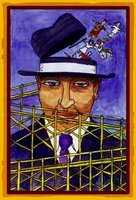Disability and Gender Stereotypes
 Today is International Women's Day. In the blogging community, this day has been designated "Blog Against Sexism Day". You can learn more about the day, find statistics relating to sexism, and get links to hundreds of posts here.
Today is International Women's Day. In the blogging community, this day has been designated "Blog Against Sexism Day". You can learn more about the day, find statistics relating to sexism, and get links to hundreds of posts here.
Initially, I was going to show my support by just linking to the posts, but then I read the organizers' words, "We especially encourage men to challenge themselves and write about the topic." So, I've been thinking about sexism and disability. I'm familiar with and have experienced ableism. And, I think that there must be an overlap between sexism and ableism. I'm just not always sure where the line is drawn. Here are a few of my thoughts.
Had I been born a girl with a physical disability, would people react to me differently? Would strangers comment on how pretty my wheelchair is rather than how fast it goes? Would my parents get more or less "I'm so sorry” glances? Would I have been encouraged to get princess casts and splints rather than sports casts and splints? And would these and other differences have changed my self-image?
With a few exceptions, my closest able-bodied friends are people I first met when I was very young. For a child with a disability, it becomes harder to make new friends in late grade school and high school. Most of my more recent able-bodied friends are female. My female friends with disabilities tell me that most of their recent able-bodied friends are male. Why is it so hard for teenagers to form same sex friendships crossing ability boundaries?
By their very nature, both ableism and sexism put a person down, with the result often being lowered self-esteem. Ironically, my peers who are female and have a disability appear to me to be tougher and more assertive than many of my peers who are female and have able bodies. Those with disabilities seem to be far less caught up in, and even laugh at, the cultural pressures on women to conform. How does disability affect sexism?
And what about Ashley X? Would parents of a 6 year old boy with a disability have been able to convince medical personnel and an ethics committee to surgically and hormonally alter their son to stunt growth? Can a boy be a "Pillow Angel"?
I look forward to reading the other posts.










3 comments:
Good succinct post. I especially liked the 'tougher and more assertive' observation. I like the thought that disability can be liberating, not constraining, for women. And it IS nice to not have to conform to cultural pressures. There are just different pressures, which are tricky but fought on a more personal level, so ultimately strengthening.
Assuming the gender stereotypes DON'T fit just becos the person is disabled, could also be bad. I got reminded of that idea from reading a different blog post today.
I mean, I don't know. I always played with cars and GI joes (AND fashion dolls and baby dolls) and only as an adult found out about being autistic and later that autistics seem to fit gender-stereotypes less than NTs seem to... but on the other hand what is so bad about either fitting them or defying them?!
in some sense, we should all just be people...
Post a Comment